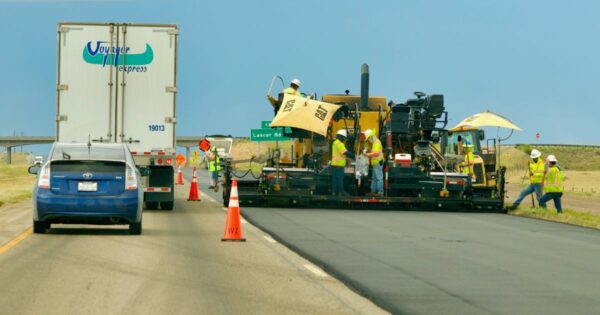GPS tracking systems have evolved far beyond simple navigation tools; they are now invaluable assets that transform business operations.
Today’s GPS technology enables real-time monitoring, theft prevention, and improved utilization—all within one integrated system. This advancement leads to enhanced efficiency, increased safety, significant cost savings, and makes fleet managers’ lives a whole lot easier.
But GPS tracking isn’t limited to managing fleets of vehicles; it offers versatile applications across various industries.
Managing large fleets of vehicles
It’s clear that GPS tracking and fleet management are inseparable. With GPS, businesses can monitor the locations, speeds, and driving behaviors of multiple vehicles across extensive fleets. This capability is particularly beneficial for companies with large vehicle operations spread across different regions. For example, a nationwide delivery service can use GPS to optimize routing, reduce fuel consumption, and lower operational costs.
Integrating GPS tracking with camera systems takes it to the next level by offering real-time visibility into vehicle operations. Fleet managers can view live feeds from their vehicles, allowing them to monitor driver behavior, respond to real-time incidents, and resolve any queries regarding delivery times quickly and effectively.
Asset tracking
GPS tracking is not just about vehicles; it’s also essential for protecting valuable assets such as construction machinery and equipment. For large construction companies managing machinery across multiple sites, GPS simplifies the tracking process. It helps keep tabs on equipment and quickly locates it once a project concludes.
“We had a lot of incidents back in the day where we lost our machines. GPS systems pinpoint exactly where the machine is, so we can find it and pick it up. CameraMatics prevents us losing equipment, plus helps us to find it”.
This technology is also crucial for plant hire companies. By equipping their machinery with GPS trackers, they can prevent theft and track stolen equipment in real-time, significantly aiding in recovery efforts.
Optimizing job scheduling for field services
GPS tracking revolutionizes field service management by optimizing job scheduling based on real-time locations and availability. Consider a vehicle recovery service that operates across a large area. GPS allows them to dispatch the nearest available vehicle to assist with breakdowns or emergencies. This capability leads to faster response times, improving customer satisfaction and operational efficiency.
Keeping your drivers safe
Safety is the number one priority for any business with a fleet of vehicles, and GPS tracking plays a crucial role in this aspect. Real-time location tracking allows for rapid responses in emergencies, breakdowns, or accidents. If a driver is involved in an accident while traveling through a remote or rural area, GPS technology can pinpoint their exact location, even if they’re way off the beaten track.
This swift response capability is vital for ensuring that help arrives as quickly as possible, potentially saving lives.
Additionally, choosing a GPS provider with reliable coverage across multiple networks is essential to prevent signal loss in remote locations. This reliability ensures that drivers are always connected and can receive timely assistance in critical situations.
Streamlining supply chains
In transportation and logistics, GPS tracking offers real-time visibility of goods in transit, which is crucial for maintaining efficiency and meeting delivery deadlines. With GPS, businesses can monitor deliveries throughout their journey, identifying any delays or disruptions that may impact timelines. This capability is particularly important for industries with time-sensitive deliveries, such as healthcare and food services.
Keep vehicles and assets safe with Geofencing
Geofencing takes GPS tracking to the next level. Imagine setting invisible boundaries around specific locations. With geofencing, you can receive instant alerts when:
- Vehicles or teams stray: Did a truck leave its designated route? Did the crew wander outside their work zone? Geofencing keeps you informed.
- Speed limits are broken: Get notified of excessive speeding to promote safe driving habits and avoid costly tickets.
- Vehicles are parked unauthorized: Identify after-hours activity or suspicious vehicle use.
This powerful tool extends beyond traditional fleets. Construction and utility companies can set virtual fences around job sites, ensuring equipment stays within these pre-defined areas.
But geofencing truly shines in theft prevention. If a vehicle exits its geofence location, you’ll be instantly alerted, allowing for swift action to track and potentially recover stolen property. It’s a virtual security fence that keeps your assets safe.
GPS for compliance
GPS tracking systems are instrumental in ensuring fleet compliance with industry regulations. By accurately monitoring driver behavior, hours of service, and vehicle maintenance schedules, businesses can demonstrate adherence to strict standards. Features like Electronic Logging Devices (ELDs) and geofencing help automate compliance processes, reducing the risk of penalties and legal issues. Plus, GPS data can be used to verify compliance during audits, providing concrete evidence of responsible operations.
Making your business more efficient, secure and responsive
GPS tracking is more than just navigation; it’s a game-changer for day-to-day business operations. From streamlining fleet management, protecting drivers and valuable assets to enhancing field service efficiency and ensuring regulatory compliance, GPS technology offers tangible benefits. It’s about making your business more efficient, secure and responsive.
Ready to harness the power of GPS tracking?
Contact CameraMatics today and see how our solutions can boost your efficiency, protect your assets, and streamline your operations.







